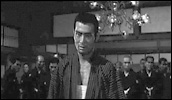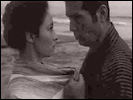The Wolves
- Year
- 1971
- Original title
- Shussho Iwai
- Japanese title
- 出所祝い
- Director
- Cast
- Running time
- 131 minutes
- Published
- 18 November 2003


by Tom Mes
To Western eyes, the yakuza film is represented by the works of Seijun Suzuki, Kinji Fukasaku and contemporary luminaries Takeshi Kitano and Takashi Miike. The paradox of this situation is that these men are all exceptions to the rule; the films they make in the yakuza genre are quite different from what is considered the quintessential form of the yakuza film, a form that is virtually unknown beyond Japan's borders.
Despite living its heyday in the 1960s, the ninkyo eiga, or chivalry film, is still considered back home as the genre's blueprint. Set in pre-war days, the ninkyo films expressed traditionalist values and portrayed their gangster protagonists as heroic, honourable men. Central to the drama of all ninkyo eiga is the conflict between giri and ninjo, between obligation or loyalty to the gang and personal feelings. Caught between a rock and a hard place, the choice the protagonist made between the two allowed him to show the audience the full extent of his honourable nature - his jingi.
The glory days of the ninkyo eiga came to an end due to Kinji Fukasaku's revisionist portrayals of gangsters as greedy contemporary cowards with Street Mobster (Gendai Yakuza: Hitokiri Yota, 1972) and especially the Battles Without Honour and Humanity series (Jingi naki Takakai, 1973-76). Seijun Suzuki, despite making the odd ninkyo film (Kanto Wanderer / Kanto Mushuku, 1963, and Tattooed Life / Irezumi Ichidai, 1965), was of course more concerned with making odd films period.
Perhaps it's a form of justice that it's the maverick artists rather than the studio artisans that have taken the glory. The ninkyo eiga were above all formulaic and a good number of the directors who made them added little beyond what was required by this formula. However, people like Tai Kato and Hideo Gosha were men who certainly managed to inject their personal touches, and it's something of a shame that their name and work, and thus the importance of the ninkyo eiga themselves, are not better known abroad.
Making his feature film debut in 1964, Hideo Gosha divided his time between gangster and samurai films for much of the 1960s and 70s, working mainly at Toho and Toei studios, before the fall of the studio system forced him into the role of a journeyman working in a variety of genres in the 80s. 1971's The Wolves, long his best-known film, is one of the most readily accessible examples of the ninkyo eiga, though not necessarily the most representative.
Starring his frequent leading man Tatsuya Nakadai, it's the story of gangster Seiji Iwahashi, who is released on a general pardon at the occasion of the Showa Emperor Hirohito's ascension to the throne in 1926, after serving only part of his ten-year sentence for the murder of the rival Kanno syndicate's boss. He returns to find that his own Enokiya gang has recently been absorbed into the Kanno syndicate after the death of the Enokiya leader. To cement the deal, the Kanno boss is about to marry Aya, the daughter of the late Enokiya leader and formerly girlfriend of Iwahashi's friend Tsutomu, who mysteriously vanished after benefiting from the same general pardon that got Iwahashi out of jail.
The central conceit of the gangster released from jail to find his gang weakened and his world changed is a premise that was used hundreds of times before Gosha made The Wolves and has been used hundreds of times since. Clichéd as it is, it does offer fertile ground for drama and conflict: with his gang disintegrated, the gangster has lived, obeyed, fought, and served time for nothing. There is the potential for interesting character development and the best ninkyo eiga are often effective character pieces.
The Wolves emphasises character development over action throughout, resulting in a running time that is unusually long for a ninkyo film. While adhering to the standard plot, Gosha has a knack for going against formula expectations on numerous occasions. A meeting with a woman after Iwahashi's release suggests the obligatory sex scene in its opening shot, but is revealed as being something quite different; the traditionalist values of most ninkyo eiga are completely absent; the violence is drawn-out and grittily realistic rather than the stylised bursts typical of the genre - Gosha's approach is, in short, remarkably and refreshingly down-to-earth and straight-faced. He goes in the opposite direction of über-stylists Seijun Suzuki and Tai Kato, but the results are no less remarkable for it.
This is not to say The Wolves is entirely successful. Tatsuya Nakadai may be best known to Western audiences for his work with Akira Kurosawa on Kagemusha (1980) and Ran (1985), but his portrayal of the tortured gangster hero oddly isn't quite up to scratch, neither in his ability to emote his character's inner turmoil nor in terms of screen presence (his co-star Noboru Ando outshines him here). Additionally, Gosha's methodology sometimes comes off as a rather heavy-handed approach to overly familiar material. For all its drawn-out characterisations, the conclusion to the story is never in any doubt, certainly not for those who have seen a ninkyo eiga or two.
At the same time, though, The Wolves is certainly never anything less than rock solid genre fare that keeps its characters as human as the formula allows, and Gosha's approach results in many striking moments. Those planning an excursion into ninkyo eiga territory could do a lot worse than make this their first destination.